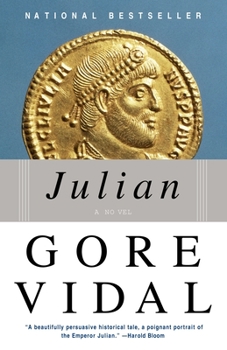Julian
Select Format
Select Condition 
Book Overview
The remarkable bestseller about the fourth-century Roman emperor who famously tried to halt the spread of Christianity, Julian is widely regarded as one of Gore Vidal's finest historical novels. Julian the Apostate, nephew of Constantine the Great, was one of the brightest yet briefest lights in the history of the Roman Empire. A military genius on the level of Julius Caesar and Alexander the Great, a graceful and persuasive essayist, and a philosopher devoted to worshipping the gods of Hellenism, he became embroiled in a fierce intellectual war with Christianity that provoked his murder at the age of thirty-two, only four years into his brilliantly humane and compassionate reign. A marvelously imaginative and insightful novel of classical antiquity, Julian captures the religious and political ferment of a desperate age and restores with blazing wit and vigor the legacy of an impassioned ruler.
Format:Paperback
Language:English
ISBN:037572706X
ISBN13:9780375727061
Release Date:August 2003
Publisher:Knopf Doubleday Publishing Group
Length:528 Pages
Weight:0.89 lbs.
Dimensions:0.9" x 5.2" x 8.0"
Customer Reviews
4 ratings
APOSTATE
Published by Thriftbooks.com User , 20 years ago
The fourth century AD is a period I have never known much about. The first I ever heard about the emperor Julian the Apostate was actually the unflattering caricature by St Gregory Nazianzen, quoted here again in the novel. There is a plus-side and there is a minus-side to reading a historical novel from ignorance of the background, the plus-side being obviously that one is not distracted from appreciating it for what it is - creative writing. I feel sure the downside outweighs that, all the same. There is obviously considerable erudition behind this book, and if I ever improve my grasp of the background I would expect to find real historical insights, whatever the author may have adapted, removed or added. What is clear to me is that Vidal at least thinks as a genuine historian - his narrative is about the right things that should go into a historical analysis. The novel is partly concerned with rehabilitating Julian, but it is about more than that, indeed about more than his life-story altogether. It is about early Christianity and the mind-sets that went with that. Julian was appalled by Christianity, and so, quite evidently, is Vidal. For him, early Christianity was a noxious perversion of human thought-processes. Christianity of this period tried to enforce beliefs, and would stop at nothing in the process. This should make us pause to ask - how can any belief be obligatory? Only our actions can be subject to our own will, let alone anyone else's, and holding a belief is not an action. There is a restricted sense in which it could be described as that, namely the sense in which `holding' means `propounding', as in a book or a lecture. In more normal usage to `hold' a belief is just to `have' a belief, and we either do or do not believe something - it's a state of affairs like having a headache, not a voluntary or enforceable act like holding a sword or holding a meeting. On top of that there is the question - what, if anything, did the doctrines the Christians were slaughtering one another over even mean? The doctrine of the Trinity was something to kill for, it seems. Even in my time the answer to rational questioning was that some `truths' (in whatever sense) were above reason but revealed by God, but of course one had to take someone's word for that. It was all of a piece with mortification of the flesh and repression of natural instincts, as Vidal quietly implies - any faculties, brain or body, that the Creator may have given us, presumably to use, were not only suspect but evil and those who saw the matter otherwise would be dealt with, as Julian himself was finally dealt with at the age of 32. The book ends with a fascinating question left suspended, as much good history does. Julian was killed in his early prime, through treachery by one of his own officers, at Ctesiphon on the Tigris, the scene of new unresolved issues even as I write. He had made a serious error in that battle, the first of his brilliant military career, but all
Splendid historical fiction with acid humor
Published by Thriftbooks.com User , 20 years ago
A novel about a Roman emperor whose rule was brief, Julian known as the Apostate was the nephew of Constantine. When he became the emperor he tried to bring back worship of the "old gods" and oust Christianity, a religion not favorably portrayed, though neither are the old ways of oracle and sacrifice. Three different views of the same historical events are presented by having three different narrators - Julian himself, and Libanius and Priscus both philosophers who knew him. The philosophers are carrying on a correspondence regarding Julian's autobiography sometime after his death at age 32. Well written and researched, this book invites fascinating "what if.......?" speculation; just imagine if he had reigned longer and been successful what a totally different place Europe would have been.
A fine Roman novel
Published by Thriftbooks.com User , 20 years ago
Before reading Julian, my only experience with Gore Vidal was his book Creation. Although that book was interesting, it ultimately failed to satisfy me, and so I delayed reading Julian for some time, despite my fascination with the topic of Roman history. Julian is a much better book. The mood of the Empire, so late in its day, is neatly captured, with it's encumbered bureacracy, rigid ceremony, political strife, and growing religious fervor. Into this strangely recognizable world enters Julian, a second-born son with an interest in philosophy and the old religious rites, and a latent flair for leadership. Vidal evokes Julian's ambitions and fascinations concerning the "old gods" and the "new cult" of Christianity. Julian champions the former on the road to the throne, scorning the Galilean's followers while maneuvering in a world where the new religion was politically charged and dangerously assertive. The book centers on this debate, but digresses into more immediate problems such as the problem of imperial succession and barbarian incursions into the Empire. Julian is forced into the role of secular leader and military commander, where he displays repressed talents in war and at court. Although his ultimate ambitions are cut tragically short, Julian is consistently portrayed as a gifted leader with sympathetic goals. He is a hero of a world that was passing away, and his valiant attempt to bring the Golden Age of pagan Rome back is a vain yet noble struggle in the face of a changing world. Vidal's personal touch is the commentary written "in the margins" by two philosophers, comparing their own experiences to Julian's first-person testimony. Their vanity, sarcasm, and selfish reflections on the apostate emperor lend levity and humanity to the novel, as well as filling in several controversial gaps that history leaves to us. Vidal's conjectures in these places are convincing and a little bone-chilling, and deftly expressed in the remarks between these two men. Overall, I was pleasantly surprised with Julian and recommend it to anyone curious about the later Roman Empire and one of its most fascinating -- and most often misunderstood -- characters.
good insight and generally accurate history
Published by Thriftbooks.com User , 26 years ago
In keeping with my belief that one should clearly label one's biases, let it be known that I am not only a pagan myself but that Julian Augustus is my personal folk hero._Julian_ covers the time leading up to, as well as including, the reign of Julian the Apostate. Several dynamics were present: his precarious youth as a potential threat to the Roman throne of Constantius, his strong philosophical leanings toward Hellenism, and his personal courage, among others. Vidal incorporates all of these factors, which shaped Julian's character, to weave a portrait of this emperor.One of the more entertaining aspects of the book is that much of it is a letter exchange between Libanius (Julian's prinicpal contemporary biographer) and Priscus (a philosopher of sorts and adherent of Julian) after Julian's untimely death in Persia. We thus are treated to humourously scathing margin notes by Libanius, generally expressing disdain for Priscus, who seems to be covering his posterior and his pocketbook. A lot of the book is Julian's memoirs themselves. It's an interesting and creative way to write a book, and a tribute to Vidal that it flows smoothly.The book would be incomplete without speculation on the real reason for Julian's death (besides the fact that he took a spear in the chest while wearing no breastplate, which is historical fact). I will spare you the spoiler; suffice it to say that this part is something to look forward to. I cannot easily refute the claim that is made when they get to it.If you like the late Roman Empire, are interested in Julian himself, or simply enjoy a good historical novel, _Julian_ is a bargain.
Julian Mentions in Our Blog

The 20,000 Volume Library of a Blind Senator That Inspired a World-Famous Author
Published by William Shelton • July 31, 2018
One never knows how their reading habits, such as this case of a blind man with a passion for books, will influence the lives of young readers.






